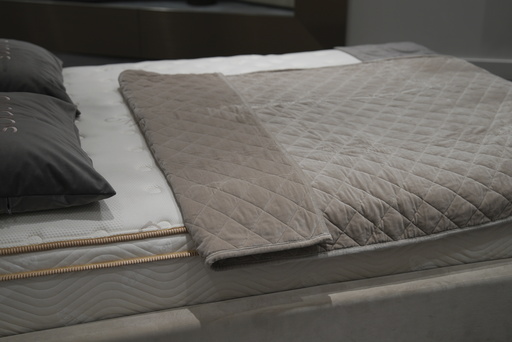
NEW YORK — Rhonda James initially had her doubts when her husband decided to purchase a weighted blanket for her. However, just five minutes after enveloping herself in it, she fell into a deep sleep. “It felt like a really big hug,” expressed James, who works as a banker in Charleston, South Carolina.
As the weather turns colder, weighted blankets are becoming increasingly favored for warmth. Many individuals believe that the added weight can help alleviate stress and promote quicker sleep onset. Despite their rising popularity, scientific research on the true efficacy of weighted blankets remains limited. Here’s what you should know.
What exactly is a weighted blanket? These blankets are designed with added weight through materials such as glass beads, pellets, or cotton filling. While there isn’t a comprehensive study detailing their mechanics, experts propose several theories on how they provide comfort. According to Dr. Neal Walia, a specialist in sleep medicine at UCLA Health, the blankets’ gentle pressure may help calm the fight-or-flight instincts of the brain. “The evenly distributed weight signals your body that you’re in a serene environment,” he explains.
The extra pressure might also trigger the release of oxytocin, often referred to as the love hormone, which is linked to feelings of comfort, bonding, and reduced anxiety.
How should you use a weighted blanket? Experts typically recommend that healthy adults select a blanket weighing around 10% of their body weight. For instance, a person weighing 150 pounds would choose a 15-pound blanket. However, these blankets are not suitable for infants or toddlers, as they could restrict movement or breathing. Individuals with sleep apnea or other respiratory conditions are advised to consult a healthcare professional before using a weighted blanket.
These blankets are not universally beneficial, and experiences can vary widely among users. For instance, some might find them uncomfortably warm during summer months. Additionally, the price of quality weighted blankets can range significantly, with costs varying from $50 to over $300, influenced by dimensions, weight, and material.
James mentions that she enjoys using hers to unwind while watching television or relaxing with a glass of wine. Similarly, Lucy Taylor, a freelance writer from Wales, uses her blanket to help manage her anxiety during the colder months. “If my body’s relaxed, my mind follows suit,” she shares.
Can these weighted blankets genuinely improve sleep? The existing research is relatively sparse, primarily focusing on small groups. Most studies tend to assess their effects on individuals with chronic sleep issues, mental health challenges, or developmental conditions rather than the average sleeper.
Some preliminary findings suggest that weighted blankets might be beneficial for anxiety, chronic pain, and sleep quality. For example, a study involving 120 people suffering from insomnia indicated that those using weighted blankets experienced better sleep compared to those with lighter blankets. Conversely, a study of 67 children on the autism spectrum found that while the weighted blanket didn’t significantly impact their sleep quality, both the children and their parents expressed a preference for it over regular blankets.
Another research involving 94 adults dealing with chronic pain revealed that while heavier blankets did not enhance sleep, they were more effective in alleviating pain compared to lighter versions.
Despite the lack of strong evidence supporting the advantages of weighted blankets, sleep experts assert that trying one may be worthwhile if you’re inclined to invest. Dr. Daniel Barone, a sleep medicine specialist at Weill Cornell Medicine, often suggests them to patients who have exhausted other traditional treatments and medications. “If it doesn’t cause harm and potentially offers benefits, it’s worth considering,” he recommends.
